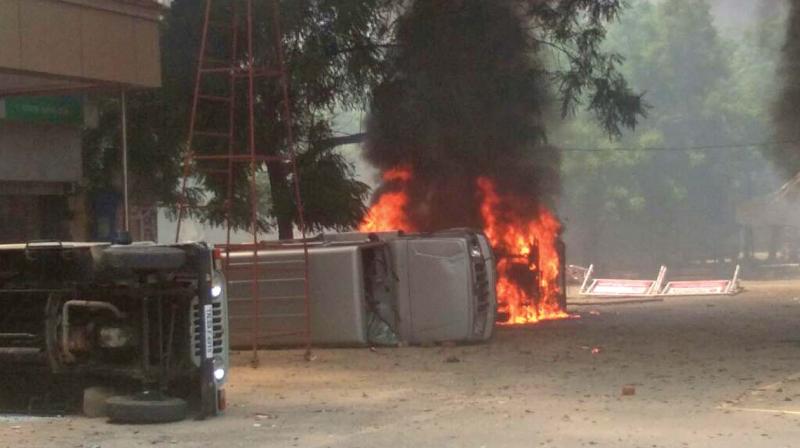Sterlite flashpoint at Thoothukudi
Several police officers were also injured in that incident during which more than 15 police/official vehicles were also set ablaze.

Chennai: The heavy human casualties in the police firing in the southern port-town of Thoothukudi on Tuesday, against protesters demanding the permanent closure of Vedanta group's copper smelter plant there on the throes of an expansion plan, shows up the mirror to the insensitive handling of a 100-day long protest and virtual collapse of 11th-hour crisis management.
Though Tamil Nadu had in recent years witnessed prolonged protests during the anti-nuclear power agitation against the Kudankulam Nuclear Power Plant at coastal Idinthakarai in neighbouring Tirunelveli district, which to the credit of the former Chief Minister J. Jayalalithaa, was handled with toughness and empathy for all her autocratic ways, the Thoothukudi tragedy could be judged as an avoidable, unseemly cap to under-governance.
Last time a major incidence of police firing in Tamil Nadu took place in recent years, was when five persons, mostly Dalits, were killed and nearly 50 others injured, when a mob turned violent at Paramakudi in Ramanathapuram district, on September 11, 2011, a few months after Ms Jayalalithaa had returned to power ending her long political drought. Several police officers were also injured in that incident during which more than 15 police/official vehicles were also set ablaze.
Strangely, the spark for that police firing had come from "news" about the Dalit leader John Pandian having been detained at Vallanadu in Thoothukudi district, apparently as a precautionary measure, when he was on way to Paramakudi to pay homage on the death anniversary of Dalit leader Immanuel Sekar. It was a grim reminder of two aspects that have made the southern districts' social fabric rather fragile, the below-surface tension between upper castes and Dalits and second, Thoothukudi being a potential hotspot of violent disruptions.
So, naturally any administration should have been far more concerned when an agitation against Sterlite plant's expansion and continuance on environmental grounds was swelling into a quasi-popular movement, even if led by NGOs' suffering bribe allegations and cracks in their ranks, for over three months. The protests against ONGC's activities at Kathiramangalam Thanjavur district, in the heart of Cauvery delta, also completed 100 days recently, but it was a placid patch on the Thoothukudi stir.
Jayalalihaa as Chief Minister was quick in taking executive decisions ably guided by her top IPS and IAS officers and would have seen the writing on the wall much earlier. This was in fact the case, going by how her erstwhile administration, unmindful of the flak, handled the anti-Kudankulam protests, by getting an experts committee to engage with the technical issues, even as the administration buffeted them in keeping chaos at bay on the ground. 'Amma' was a vintage combo of Kamaraj and Annadurai those days, virulent yet mature in keeping the social fabric intact. In the same breath, credit should also go to the anti-nuclear power activist SP. Udayakumar and the patient villagers who ensured that the agitation was substantially on non-violent lines.
Rather sadly, the post-Jaya regime, caught in the thick of an internal power struggle among various factions, has with this Thoothukudi violence touched a new low in lethargic governance, say political observers. Amid Opposition parties drumming up the rhetoric of a 'political vacuum', there is a sinking feeling among commoners that the present regime has become some sort of a 'sitting duck' to multiple forces that have emerged in recent months due to this very 'vacuum'.
Chief Minister K. Palaniswami has been smilingly taking much of the hit in the storm. The reasons for this predicament is not difficult to seek: delayed decision making leads to a slump in public confidence in the government, as the issues of reopening of sand mines and Tasmac wine shops show.
Second, there is a flurry of second-order political activities, with little known politicians like T. Velmurugan, a dissident PMK MLA who went on to float his own outfit taking to the streets, or a Seeman trying to raise the pitch of Tamil nationalism; or for that matter yesteryear stars like Kamal Haasan and Rajinikanth seeking to heli-hop into Fort St.George. These parallel events reinforce the impression that political leadership in Tamil Nadu is not strong. "We miss you Amma" may aptly sum up the situation.
Sterlite pleads for peace
The beleaguered Sterlite has pleaded for peace while pointing out that its copper plant Thoothukudi is "currently non-operational as we await approval for the Consent to Operate".
"It is with great sorrow and regret that we witnessed today's incidents around the protest at Tuticorin. The company has appealed to the government and authorities to ensure the safety of our employees, facilities and the surrounding community. The Sterlite Copper plant is currently non-operational as we await approval for the Consent to Operate", the company said.

